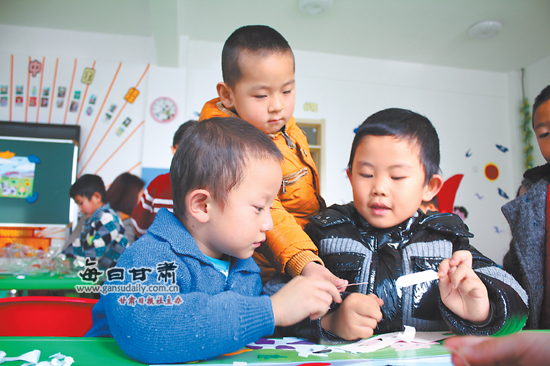Gansu paves the way for impoverished students
chinagate.cn by Fan Anqi, April 12, 2016 Adjust font size:

Gansu Province in west China has been taking targeted measures to alleviate poverty since 2015, covering a wide range of aspects including pre-school education, compulsory education and vocational education, in a bid to help families get rid of poverty through an equal and balanced education.
More chances provided for rural children
The Kindergarten enrollment rate in 2011 was below 40 percent in Gansu Province, while the number has experienced an upsurge during the past few years, at 75 percent in 2015, according to the latest data from the local education department.
Rural areas in Gansu had a particularly low enrollment rate back in 2011, as a result of shortages in qualified kindergartens and high costs. The provincial government has therefore made it a priority to allocate more educational resources to poverty-stricken regions so as to better release the labor force, promote urbanization and eventually eliminate poverty.
A series of measures have been taken to encourage rural children to enter kindergartens. Gansu has allocated 918 million yuan (US$141 million) to subsidize the tuition fee for pre-schools, meaning that every family will get 1,000 yuan (US$154) of subsidy to choose any of the kindergartens they like in the area.
Gansu has also built or expanded over 1,300 kindergartens during the past three years, providing children with more opportunities as a way to promote balanced and equal education. Consequently, many “left-behind” children, mostly raised by grandparents in poverty-stricken counties, are now being given improved care services.
In addition to pre-school education, Gansu has issued plans to encourage colleges and universities to increase enrollment for students from impoverished areas. As stated in the plan, priority of admission should be given to impoverished students if the scores of college entrance examinations are even.
Promoting the balanced development of schools
Promoting the balanced development of schools by upgrading facilities and improving teaching quality in poverty-stricken areas is also an important issue in Gansu.
Funds have been set up to provide capital for the reconstruction and expansion of rural schools, replacing the old, dilapidated teaching buildings with new ones and upgrading hardware facilities in classrooms as well as on the playgrounds, bringing benefits for thousands of schools and millions of students.
Improving the teaching quality in rural schools is even more valued. Apart from recruiting more teachers, local governments have also organized professional training for teachers, which can be served as a platform to share teaching experiences, broaden teachers' horizons and enrich their knowledge.
Full subsidy of education for impoverished students
Students who are identified by local officials as "impoverished" in Gansu are now able to receive fully subsidized education from their pre-school years all the way through to college, thanks to the recently issued policy.
For pre-school subsidies, the local government will cover all the costs by endowing families with 2,000 yuan (US$308) each year, in an attempt to ease the financial burden for parents and guarantee all children a qualified basic education at the very beginning of their academic career.
For the financial support during China’s compulsory education period, the 8.8 million students in rural Gansu are now able to enjoy free meals, as their board expenses have been eliminated and other financial aid packages have also been granted.
For college students in rural areas, Gansu offers student loans worth up to 8,000 yuan (US$1,233) annually, with the loan’s interest fully covered by the government. Vocational school students would additionally receive a 2,000 yuan (US$308) subsidy to cover their learning expenses.